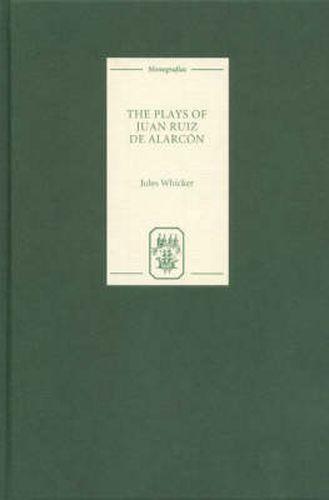Readings Newsletter
Become a Readings Member to make your shopping experience even easier.
Sign in or sign up for free!
You’re not far away from qualifying for FREE standard shipping within Australia
You’ve qualified for FREE standard shipping within Australia
The cart is loading…






The plays of Ruiz de Alarcon, a significant dramatist in the Spanish Golden Age, show in many of their plots a preoccupation with deception, which Whicker believes reflects Alarcon’s fundamental concern about truth-telling in literature. His study of Alarcon’s comedias stresses the seriousness and moral orthodoxy of the playwright and his concern with how simulation and dissimulation can be viewed both positively and negatively in theatre as well as in life. In support of his argument for the seriousness of Alarcon’s theatre - his challenge to his audience to think hard and clear about his play, particularly over the issue of illusion, deception and dissimulation - Whicker focuses on the moral arguments perceived in Alarcon’s theatre, and their reference to serious literary-moral issues current in the Golden Age; he tests the relevance of his argument against contemporary circumstances, the ethics of privanza in particular. JULES WHICKER lectures in the department of Hispanic studies, University of Birmingham. El teatro de Ruiz de Alarcon, dramatugo importantisimo del Siglo de Oro, demuestra en la elaboracion de la trama una preocupacion por el engano y, en esta monografia, Whicker sostiene que esta misma preocupacion refleja el interes fundamental que tenia Alarcon en la idea de la expresion de la ‘verdad’ en la literatura. Su estudio de las comedias de Alarcon subraya la seriedad y la ortodoxia moral del dramaturgo y su preocupacion por la manera en que la simulacion y la disimulacion pueden verse tanto positiva como negativamente en el mundo del teatro y en el gran teatro del Mundo. Whicker se enfoca en los argumentos morales expresados en el teatro de Alarcon, y especificamente en la manera en que estos argumentos aluden al debate contemporaneo en el Siglo de Oro sobre la etica, la verdad y la literatura. Analiza rigurosamente la relevancia de estas ideas con respecto a la etica de la privanza en particular.
$9.00 standard shipping within Australia
FREE standard shipping within Australia for orders over $100.00
Express & International shipping calculated at checkout
The plays of Ruiz de Alarcon, a significant dramatist in the Spanish Golden Age, show in many of their plots a preoccupation with deception, which Whicker believes reflects Alarcon’s fundamental concern about truth-telling in literature. His study of Alarcon’s comedias stresses the seriousness and moral orthodoxy of the playwright and his concern with how simulation and dissimulation can be viewed both positively and negatively in theatre as well as in life. In support of his argument for the seriousness of Alarcon’s theatre - his challenge to his audience to think hard and clear about his play, particularly over the issue of illusion, deception and dissimulation - Whicker focuses on the moral arguments perceived in Alarcon’s theatre, and their reference to serious literary-moral issues current in the Golden Age; he tests the relevance of his argument against contemporary circumstances, the ethics of privanza in particular. JULES WHICKER lectures in the department of Hispanic studies, University of Birmingham. El teatro de Ruiz de Alarcon, dramatugo importantisimo del Siglo de Oro, demuestra en la elaboracion de la trama una preocupacion por el engano y, en esta monografia, Whicker sostiene que esta misma preocupacion refleja el interes fundamental que tenia Alarcon en la idea de la expresion de la ‘verdad’ en la literatura. Su estudio de las comedias de Alarcon subraya la seriedad y la ortodoxia moral del dramaturgo y su preocupacion por la manera en que la simulacion y la disimulacion pueden verse tanto positiva como negativamente en el mundo del teatro y en el gran teatro del Mundo. Whicker se enfoca en los argumentos morales expresados en el teatro de Alarcon, y especificamente en la manera en que estos argumentos aluden al debate contemporaneo en el Siglo de Oro sobre la etica, la verdad y la literatura. Analiza rigurosamente la relevancia de estas ideas con respecto a la etica de la privanza en particular.